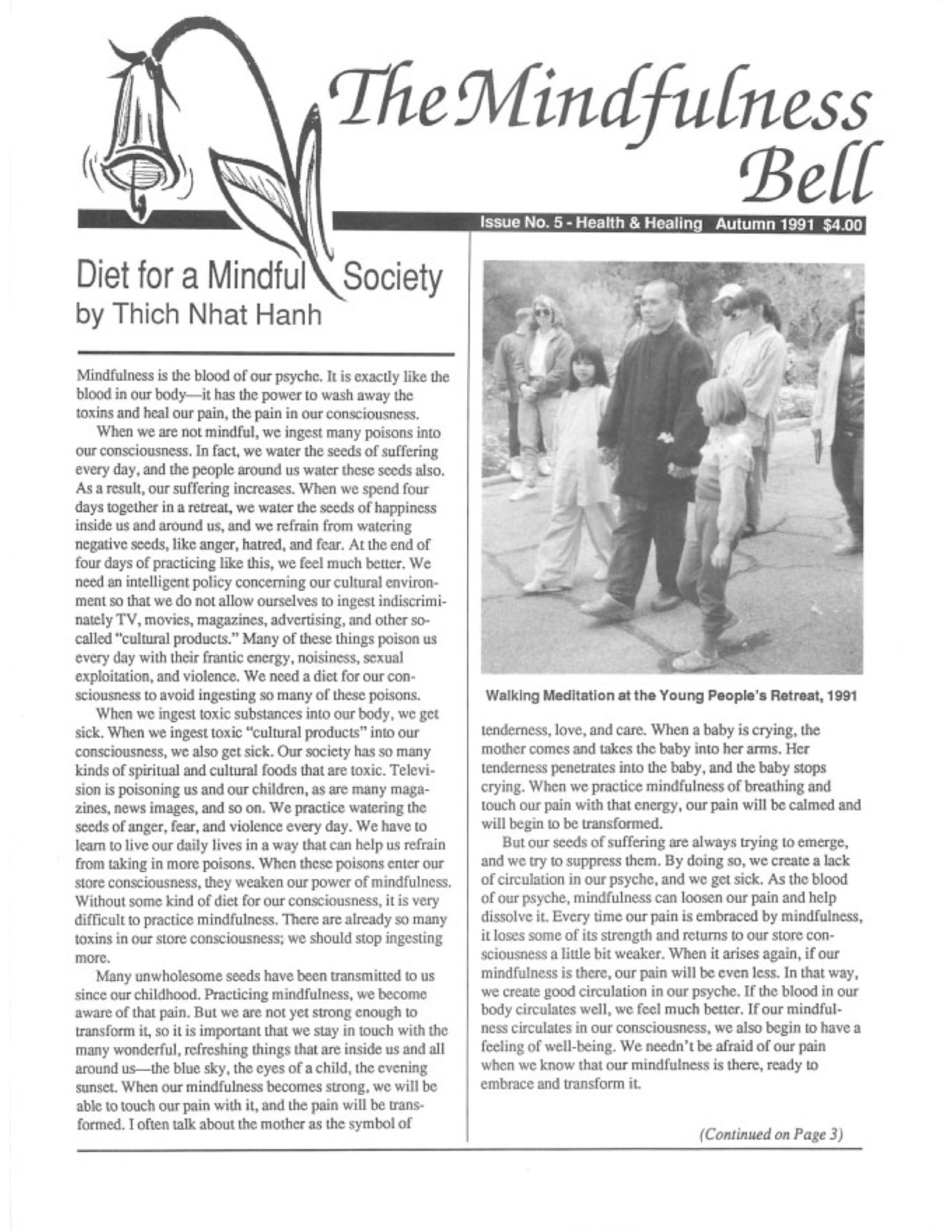By Patricia Ellsberg
Since attending two retreats with Thich Nhat Hanh at Mt. Madonna, this spring, I have had the feeling of being “in love,” not just with Thay and Sister Phuong but with a whole community and a way of life. And when I vowed to follow the precepts, I felt as if I were making a commitment as serious and profound as taking marriage vows.
I have no doubt of the powerful and far-reaching effect the precepts can have on my life if I take them to heart And yet,
By Patricia Ellsberg
Since attending two retreats with Thich Nhat Hanh at Mt. Madonna, this spring, I have had the feeling of being "in love," not just with Thay and Sister Phuong but with a whole community and a way of life. And when I vowed to follow the precepts, I felt as if I were making a commitment as serious and profound as taking marriage vows.
I have no doubt of the powerful and far-reaching effect the precepts can have on my life if I take them to heart And yet, during the retreats I found a question persistently reoccurring as to the relevance of my own personal practice of the precepts to social change. In the face of the massive violence and injustice in the world, what difference does it make if I follow the precepts, or even if all the thousands of people Thay has touched with his teachings live by them more fully? How would this bring about the radical social transformations that are necessary?
I found myself uncomfortable with what I perceived to be an underlying premise of the retreat: that if enough individuals change, society will change. In my understanding, society is not simply an aggregate of individuals. It is also shaped by social structures and concentrations of power and wealth. There are vested interests that have disproportionate control and work to maintain and profit from inequality and militarism. These forces need to be challenged and transformed before there can be genuine peace or justice.
In a flash, or recognition, I saw that many of the policies of my country and those of other nations are based on the flagrant disregard of the precepts. In fact, much of the evil in the world comes from the systematic—and often societally sanctioned—violation of the precepts by governments, corporations, and other institutions. Let us measure our own society's conduct by the precepts.
The First Precept - Think of the Gulf Massacre in this context and the glorification of the slaughter of over a quarter of a million people, many of them civilians. We live in a war economy fueled by a vast military-industrial complex and billions of dollars of arms sales. Our nuclear policy is based on the threat of mass murder, our foreign policy upon institutionalized violence. Our economy depends on the wholesale destruction of nature.
The Second Precept - We as Americans comprise 6% of the world's population and consume 40% of the world's resources. Many of these resources flow to us from countries ruled by dictatorships that our government has installed, supported, and controlled. In turn they set terms of trade favorable to us, while exploiting and terrorizing their own people, with our government's covert support. This amounts to official theft, not "exchange." Most of our military might is used to control what is not rightly ours.
The Third Precept - Think of the energy and resources our society devotes to stimulating sexual desire unconnected to commitment or love—through advertising, pornography and popular culture in general.
The Fourth Precept - Governments and politicians lie. The secrecy system exists not so much to keep secrets from the enemy as to keep the truth from the public. Our government routinely resorts to force rather than peaceful means to deal with conflict, while claiming the opposite, as in Panama, Libya, Nicaragua, Grenada, and Iraq.
The Fifth Precept - We are constantly bombarded by advertising for alcohol, cigarettes, caffeine, pharmaceutical drugs. Even more pernicious, our government, through its covert intelligence apparatus, is secretly but deeply involved in abetting the operators of the drug trade: as has become evident in the Iran-Contra scandal.
Suddenly, during the retreat, I saw a way the precepts can be of utmost social relevance. We must hold them as a standard of behavior for nations, institutions, and corporations as well as for individuals. It is essential that we end the double standard that exists between public and private morality. We must ask of our country what we ask of ourselves.
Those of us living in a democracy have a special obligation to do all we can to move our nation along with our own lives in the direction of following the precepts. We must act separately and together to prevent the government that represents us from supporting mass murder and terrorism, stealing, lying, supporting drug traffickers, and raping the earth. In fact, our survival, in the long run, depends on it.
Likewise, the more fully we follow the precepts, the more powerfully we can act for social change. Indeed, political work is an extension of personal life.
In the spirit of Thay's reformulation of the precepts in positive terms, imagine a world in which individuals and institutions alike act with compassion and loving kindness, where governments as well as the citizens they serve are mindful, cultivate a healthy environment, and truly protect the lives of people, animals, and plants. Imagine a time when the resources of the earth are redirected away from killing and towards the enrichment of life.
What if our President's policies conformed to Buddhist principles, Americans pledged allegiance to the Five Precepts as well as the flag, and we celebrated Interdependence Day along with the Fourth of July? Such thoughts inspire in me a Buddha Smile.
Patricia Ellsberg is a social change activist who speaks publicly about deep ecology and a new paradigm for foreign policy.

